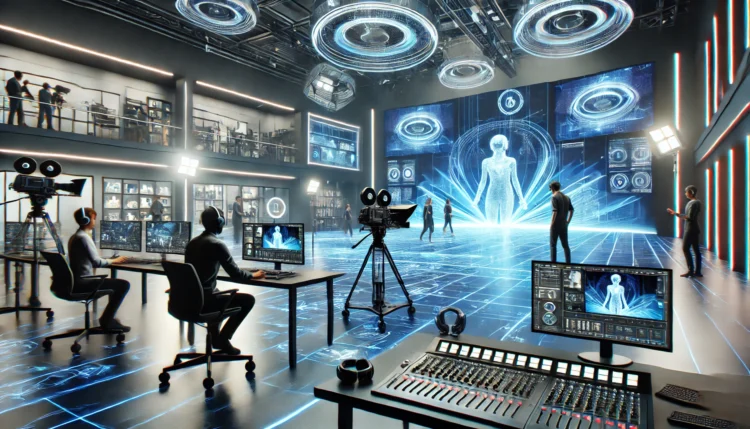
The Evolution of Media Production
The Evolution of Media Production in the UK: Trends and Innovations
Introduction
The UK has been a global leader in media production, shaping the television, film, and broadcasting industries for decades. From the BBC’s early days to the rise of streaming services and AI-driven content, the industry has undergone remarkable transformations.
Today, advancements in virtual production, CGI, and AI-powered storytelling are revolutionizing the way media is created and consumed. In this article, we’ll explore the history, key trends, innovations, and the future of UK media production.
A Historical Overview of UK Media Production
The Early Days of Broadcasting
BBC founded in 1922, pioneering public service broadcasting.
ITV launched in 1955, introducing commercial television.
Rise of BBC Radio and Pirate Radio Stations, shaping the UK’s audio landscape.
The Growth of Independent Production Companies
The 1980s and 1990s saw the emergence of independent TV and film studios.
Hit shows like Doctor Who, The Crown, and Black Mirror were produced by UK-based companies.
The Golden Age of British Cinema
The UK became a hub for Hollywood productions (James Bond, Harry Potter).
Studios like Pinewood, Shepperton, and Leavesden became world-class production centers.
The Impact of Digitalization on UK Media
The Shift from Analog to Digital
The UK switched from analog to digital broadcasting in 2012.
Freeview and Sky Digital provided consumers with diverse viewing options.
Streaming Services Reshape Consumption
BBC iPlayer (2007) paved the way for on-demand viewing.
The UK saw the rise of Netflix, Amazon Prime, and Disney+, changing audience behavior.
The Social Media Revolution
Platforms like YouTube, TikTok, and Instagram empowered independent content creators.
British influencers like KSI, Zoella, and Joe Sugg gained global recognition.
Innovations in Television and Film Production
Virtual Production and CGI
The UK is adopting LED volume sets and virtual reality (VR) production.
Films like The Mandalorian inspired UK studios to integrate real-time CGI.
AI and Machine Learning in Storytelling
AI tools like ScriptBook and ChatGPT assist in scriptwriting and trend analysis.
Personalized content recommendations improve audience engagement.
The Rise of High-End Drama Productions
The UK has become a global leader in premium drama series.
Shows like Peaky Blinders, The Crown, and His Dark Materials receive international acclaim.
The Role of Streaming and On-Demand Services
Decline of Traditional Television
Younger audiences are moving away from live TV in favor of on-demand services.
Sky Go, Now TV, and BritBox offer new ways to access British content.
Subscription Video on Demand (SVOD) Trends
More people subscribe to multiple streaming platforms, affecting TV networks.
Exclusive UK productions drive subscriptions to BritBox and BBC iPlayer.
Future of Live Broadcasting
Sports, news, and reality TV still rely on live broadcasting.
Channels are incorporating interactive elements (second-screen experiences).
The UK’s Role in Global Media Production
International Collaborations
The UK frequently co-produces content with Netflix, HBO, and BBC America.
Shows like Sherlock and Fleabag gain worldwide popularity.
Hollywood and Bollywood in the UK
Hollywood blockbusters like Star Wars and Mission: Impossible are filmed in UK studios.
Bollywood has also embraced UK locations for major productions.
Government Policies and Tax Incentives
The UK offers generous tax reliefs for film and TV production.
The British Film Institute (BFI) supports emerging talent and independent studios.
Technological Advancements in Broadcasting
4K, 8K, and HDR Adoption
BBC and Sky are investing in Ultra HD and HDR content for premium experiences.
AI-Driven Content Personalization
Platforms like BBC iPlayer and Sky Q use AI to suggest personalized content.
Interactive and Immersive Media
The UK is experimenting with VR storytelling, AR-enhanced news, and gamified experiences.
Challenges Facing the UK Media Industry
Global Competition from Streaming Giants
Netflix, Amazon, and Disney+ dominate, making it harder for local UK productions.
Regulation and Censorship Issues
Online safety laws and media regulations impact content distribution.
Brexit’s Influence on Media Partnerships
Brexit has disrupted UK-EU co-productions, leading to funding challenges.
The Future of UK Media Production
Predictions for the Next Decade
AI-driven content will become more common.
Augmented Reality (AR) and Virtual Reality (VR) will enhance storytelling.
Sustainable and green production will be prioritized.
Eco-Friendly Production Practices
Studios are embracing LED lighting, digital sets, and waste reduction strategies.
The Role of AI in Media Creation
AI-powered tools will assist in editing, scriptwriting, and audience engagement.
Conclusion
The UK’s media production industry has transformed from traditional broadcasting to digital-first, AI-driven storytelling. With a strong foundation in film, television, and online content, the UK remains a global leader in entertainment.
As the industry embraces sustainability, new technologies, and streaming innovations, the future of UK media production looks brighter than ever.
FAQs: The Evolution of UK Media Production
1. What are the biggest trends in UK media production today?
The biggest trends include virtual production, AI-driven content, and the growth of streaming services like Netflix and BritBox.
2. How has digitalization impacted UK media?
Digitalization has shifted content consumption from TV broadcasting to on-demand streaming, making services like BBC iPlayer and Netflix dominant.
3. Why is the UK a major hub for film production?
The UK offers world-class studios (Pinewood, Shepperton), skilled talent, and tax incentives, attracting Hollywood and Bollywood productions.
4. What role does AI play in UK media production?
AI is being used for scriptwriting, content personalization, and CGI enhancements, streamlining the production process.
5. How is Brexit affecting the UK media industry?
Brexit has led to funding issues, visa restrictions, and fewer co-productions with European companies.
6. What is the future of UK media production?
The industry is moving towards sustainable production, AI integration, and interactive storytelling through AR/VR.
